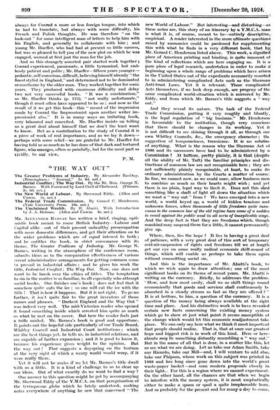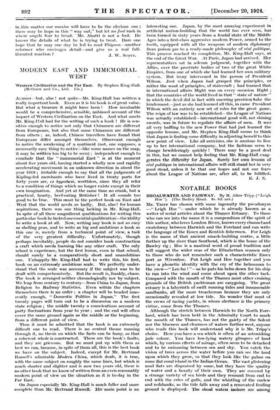"THE WAY OUT"
The Greater Problems of Industry. By Alexander Ranigay. .(Birmingham "Journal," 3s. 6d. net.) The Federal Trade Commission. By Gerard C. Henderson. -(Yale University Press. His. net.)
The Unclaimed Wealth. By H. Abatti. With Introduction by J. A. Hobson. (Allen and Unwin. 6s. net.)
Ma. ALEXANDER RAMSAY has written a brief, ringing, opti- mistic book meant to rouse British Industry—Labour and Capital alike—out of their present unhealthy preoccupation with mere domestic differences, and get their attention on to the wider problems which are of equal interest to both ; and he entitles the book, in strict consonance with its theme, The Greater Problems of Industry. Mr. George N. Barnes, writing in the atmosphere of the conference room, submits ideas as to the comparative effectiveness of various recent administrative arrangements for getting common sense to prevail in industrial affairs ; and he gives his work the title, Industrial Conflict; The Way Out. Now, one does not want to be harsh over the ethics of titles. The temptation to sin in the matter is so familiar, to all especially who attempt social books. One finishes one's book ; does not feel that it somehow quite cuts theice ; so one will cut the ice with the title ! That is how it happens.. But it is not right. To go no further, it isn't quite fair to the great inventors of those names and phrases. "Darkest England and the Way Out" was indeed very well. The midNictorian reader who opened it found something inside which arrested him quite as much as what he met on the cover. But here the reader feels just a trifle misled. Mr. Barnes's book is good and opportune. It points out the hopeful side particularly of our Trade Board, Whitley Council and Industrial Court institutions ; which are the best things yet, he tells us, in industrial relations, and arc capable of further expansion ; and it is good to know it, because his experience gives weight to the opinion. But the way out ! That suggests a dayspring on the horizon at the very sight of which a weary world would weep, if it
were really there. Yet it will not be amiss if we let Mr. Barnes's title dwell 'with us a little. It is a kind of challenge to us to clear up our ideas. Out of what exactly do we want to find a way ?
One answer to this question might be got by accompanying Mr. Sherwood Eddy of the Y.M.C.A. on that peregrination of the terraqueous globe which he lately undertook, making notes everywhere of anything he saw that Concerned' "The
new World of Labour." But interesting—and disturbing—as these notes are, this story of an itinerary by a Y.M.C.A. man is what it is, of course, meant to be—entirely descriptive,, empirical. A reader interested in the more ultimate questions raised by economics could be pardoned for supplementing this with what he finds in a very different book, that by Mr. Gerard C. Henderson listed above. This work, a dignified piece of American printing and binding, is quite innocent. of the kind of reflections which are here engaging us. It is a: pure piece of legal research, undertaken in order to make g beginning upon a whole range of problems Which have arisen in the United States out the expedients necessarily resorted to in administering complicated Acts such as the Sherman Anti-trust Laws. Yet it is relevant. These complicated' Acts themselves, if we look deep enough, are progeny of the same complicated world-situation which is mirrored by Mr. Eddy, and from which Mr. Barnes's title suggests a way. out."
And they reveal its nature. The task of the Federal Trade Commission, putting it very roughly and bluntly, is the legal regulation of " big business." Mr. Henderson is favourable to the institution, though very conscious that there should be changes in its working. Yet it is not difficult to see shining through it ail, as through our own Whitley Councils, &c., the emergency character ; the suggestion of temporariness, transience. It is no solutioo of anything. What is the reason why the Sherman Act of 1890 and its successors have had to.. be administered by a Commission ? At bottom, pretty plainly, it is that (despite all the ability of Mr. Taft) the familiar principles and dis- tinctions of common law are not recognizable here ; they are not sufficiently plainly recognizable, at least, to make its ordinary administration by the Courts a matter of course: In fine, we cannot now, as we could once, allow business men to combine as much as their hearts might wish ; and yet there is no plain, legal way to limit it. Does not this shed something like a shaft of light all down the situation which we want a "way out" from ? We have emerged into a new world, a world keyed up, a world of hidden tensions and urdcnown forces, where thousands of little freedoms quite inno- cuous to the common law of the old regime have come of a sudden to recoil against the public weal in all sorts of inexplicable ways. And the deep fact is that they are freedoms which, though mankind may suspend them for a little, it cannot permanently give up.
Where, then, lies the hope? It lies in having a great deal of patience, with a very great deal of this sort of temporary mid-air-suspension of rights and freedoms till we at length get our eye on some really radical economic shift-round of things, which will enable us perhaps to take them again without committing social sin.
And this is the importance of Mr. Abatti's book, to which we wish again to draw attention ; one of the most significant books on its theme of recent years. Mr. Abatti writing on the currency. Briefly, he addresses the problem, 'How, and how most easily, shall we so shift things round economically that goods and services shall continuously be absorbed in a steady stream as fast as they are offered ? " It is at bottom, to him, a question of the currency. It is a question of the money being always available at the right time and place. And his distinctive work is to have revealed certain new facts concerning the existing money system which go to show at just what point it seems susceptible of the change which would let this economic readjustment take place. We can only say here what we think it most important that people should realize. That is, that at once our greatest hope and biggest risk is in work of this kind. Here or here- abouts may lie something distantly resembling a " way out." But in the name of all that is dear, in a matter like this, let us see what we are doing. Let us take our Adam Smith, take our Ricardo, take our Mill—and, I will venture to add also, take our Phipson, whose work on this subject was printed in 1888 and has long since gone down into the world's great waste-paper basket—and scan modern proposals closely in their light.. For this is a region where we cannot experiment. On the other hand, all the chances are that ivhen we begin to interfere with the money system, it is most emphatically either to make a spoon or spoil a quite irreplaceable horn. And so probably for the present and for many a day to come, in-this matter our maxim will have to be the .obvious one ; there may be hope in this "way nut," but let nolfool rosh in where angel§ "fear 'trd. Mr. Abatti is not a fool.- He knows the details of what he is trying to treat. Dare one hope that he may one day be led to read Phipson--another reformer who envisages detail—and give us a real full-











































 Previous page
Previous page